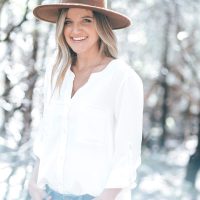*This is an excerpt from Ashley Anne’s book, Love Yourself First: 12 Lifestyle Lessons on Prioritizing Your Person.
~
My favorite thing to do on this entire planet is to wake up and realize I have time to go back to sleep.
The feeling of sliding back into my bamboo sheets to cuddle with my bulldog is beyond compare. The outside world doesn’t exist.
I mean, can you imagine how tough it is to leave this cute little smush face every morning?
My mornings are sacred magic—a time to do some last-minute dreamwork, meditate in alpha brain waves, and celebrate the deliciousness of being alive another day.
For whatever reason, sleeping in the morning feels decadent and indulgent to me. There’s nothing else that makes me feel more pampered, prosperous, and revived.
Slow mornings are the key to my happiness, not only because I can sleep on my own schedule most of the time, but also because these are the hours I use to invest in myself most. It’s when I connect with my Spirit Guides, take my vitamins, drink my organic orange juice, and venture into nature on my morning hikes.
Mornings are the time I use to love myself first.
It took me a long time to give myself the gift of mornings. Like most people, I grew up in a culture of early morning education, after school activities, and after-hours homework. Every minute of my weekday was scheduled for the majority of my life. And this wasn’t just when I was in K-12.
I tacked on an additional 11 years of higher education, advancing on to get my bachelors, masters, and doctoral degrees. I even squeezed in a two-year fellowship along the way. It wasn’t until I got PhD after my name that I finally slowed down long enough to realize that all that structure had made me sick.
My day-to-day to-do list had nothing to do with what my body needed, what my mind wanted, or what my spirit craved. Our culture forced me to conform to a rigid schedule built by people I didn’t even know, and who—most importantly—didn’t know me.
Even though on the surface my life belonged to me, if you’d had looked at my schedule, it had absolutely nothing to do with me. It was a culmination of events that represented what others expected me to do, needed from me, and desired for me.
By the time I finished up my PhD, I had had enough. I’d spent nearly three decades of my life prioritizing other people’s expectations for me, following a path I hadn’t paved, and conforming to an external calendar.
It perhaps then shouldn’t have been a surprise that when I finally held my doctoral degree in my hand, I was struck with a deep, profound bout of depression that left me chronically fatigued, entirely defeated, and without the will to do what was next.
It took time for me to realize that the depression was simply a powerful form of communication from my inner self—the part of me I’d long ago abandoned in exchange for external approval and outside signs of validation.
The bout of depression slowed me down so I could realize I was no longer connected to my body’s inner rhythm, the inner whispers from saying I’m tired, I’m hungry, or I want to play.
I also noticed my mind was constantly cluttered with scripts of self-criticism and that I lacked self-worth entirely. My friends were scattered across the country far away, and I’d entirely neglected to prioritize attracting any sort of partnership. Overall, I had little access left to the infinite energetic source of my spirit.
I’d invested my entire life into prioritizing other people—what they wanted, what they expected, and what they needed. For what? A piece of paper and a few letters behind my name.
It took a very long time for me to mourn my losses, shed the skin I’d lived in, and get reacquainted with myself. And it wasn’t easy. I felt lost about what to do in my career, ebbing and flowing between job applications that didn’t interest me, trying to get my business off the ground, and traveling too far to take advantage of opportunities that had too little of a return.
At least with my professional life I had an idea of what I was good at and what I could offer. Since professional development was where I had put most of my energy up until then, it was an easy access point. My personal life was a different story entirely.
It’s not that I hadn’t had partners, spent time with my family, or did things I enjoyed the entire time I was in school. That wasn’t the problem. The issue is that I didn’t know what I enjoyed, what felt good, or how to make space for either.
I’d become so accustomed to serving other people’s needs and expectations that I was no longer aware of my own.
It took a long time to recover a sense of myself, and I had to be gentle, forgiving, and patient along the way. If I’m being honest, every time I made my own decisions, prioritized play, or slept in even a bit, I was hit by a barrage of messages in my mind that scared me into thinking I’d get into trouble. Anything that felt too easy, indulgent, or enjoyable sent off alarm bells for me, sending the signal that I was doing something wrong.
Of course, this was exactly what I had learned, because to a certain extent, it was true. If I made my own decisions as a kid, going outside for recess during math class, I would have gotten detention. If I had prioritized a playful vacation with a partner during my PhD instead of showing up for supervision, my supervisor could have penalized me and threatened my chances of graduation. If I slept in on a random Tuesday when I was a university professor, I would have missed class and been reprimanded by my boss.
For most of my life, if I did what I wanted, there was a punishment waiting for me on the other side. After three decades of this programming, the neural pathways in my brain associated with troublemaking were so well-wired that it makes perfect sense it became my default mode. To say the least, it took a lot of time, intention, and attention to rewire them.
Overall, rewiring my brain and reconnecting to myself came down to making a single shift: I loved myself first.
I learned to prioritize my physical needs, eating when I was hungry instead of skipping lunch, going to the bathroom when I felt like it instead of sitting through one more page of writing, and seeing clients at a point in the day when my energy aligned with the task at hand.
I prioritized meditation and diligently decluttered my mind, explored the origins of my low self-worth, and replaced self-criticism with self-love.
My relationships became more of a priority too. I raised my standards for the behavior I expected from potential romantic partners, invested in showing up for my friends, and more routinely reached out for support.
I also deepened my intuition, learned to trust the whispers from the Universe, and leaned into the path my spirit felt was right for me.
I am more happy, healthy, wealthy, and free than I have ever been in my entire life, and I owe all of this to loving myself first.
Sometimes this means I prioritize my beliefs, needs, and desires over what other people expect from me. But mostly this means that my primary investment every single day is in myself. My mornings usually set the tone.
When I wake up, reach for my phone, and connect with the world first thing in the morning, this sets a precedent for my entire day. What I’ve communicated to myself on these mornings is that the external world matters more.
Once I’ve made that external investment of time, attention, and energy, it’s tough to reclaim it throughout the day because once I invite it into my awareness, the external world naturally begins to make its demands.
But when I wake up, linger in bed for a bit, meditate, and remember what a gift my life is, it also sets a precedent. On those days, the message to prioritize myself is clear. I respond to my needs, put myself in a grounded vibration, and reinforce my boundaries between who I am and who the outside world wants me to be. By the time the external world seeps into my awareness, I’m more ready to maintain my own sense of self alongside others’ needs.
My hope is that my story inspires you to let go of what others need, desire, and expect from and for you long enough to love yourself first and foremost. I am convinced this is the only way humans are designed to operate. Love yourself first and it will be easier to pour that love into the world.
May you be happy. May you be healthy. May you be wealthy. May you be free. And may you always and forever, love yourself first.
~
Please consider Boosting our authors’ articles in their first week to help them win Elephant’s Ecosystem so they can get paid and write more.









Read 10 comments and reply